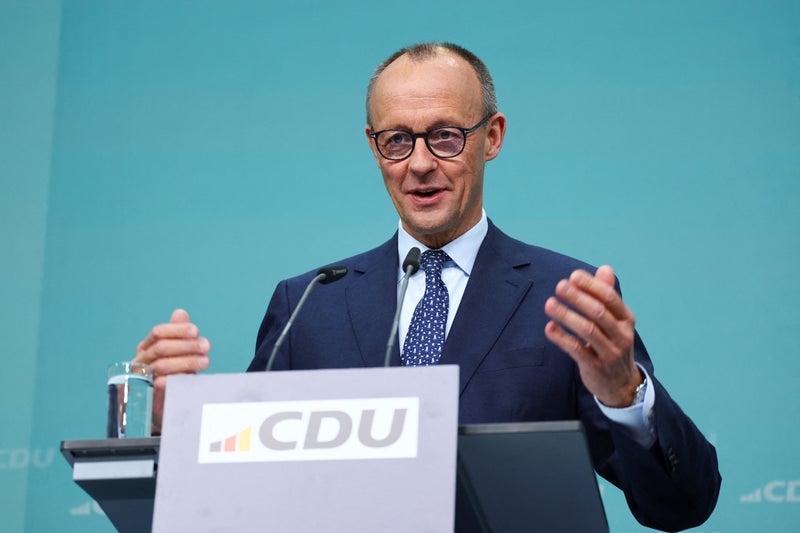Friedrich Merz has taken aim at the US and says Europe must stand up for itself. Friedrich Merz is set to become Germany’s next chancellor after early results show his conservative Christian Democratic Union (CDU) party has won the country’s snap election.
![[Donald Trump has thrown Europe’s relation with the US into chaos]](https://static.independent.co.uk/2025/02/24/06/TRUMP-FRANCIA-REINO_UNIDO_94449.jpg)
The 69-year-old politician and lawyer made his mark within hours of his victory by taking aim at US president Donald Trump. In the past, an outspoken proponent of America and its liberal economic politics, on the cusp of power Mr Merz made his new position clear.
![[Alice Weidel, leader of the AfD in the Bundestag]](https://static.independent.co.uk/2025/02/23/20/Germany_Election_39686.jpg)
"For me, the absolute priority will be to strengthen Europe as quickly as possible so that we can achieve real independence from the USA step by step," he said on Sunday. The CDU jumped to first place in the election after narrowly losing out in the 2021 election. Under Chancellor Angela Merkel, the CDU led the country for 16 years, from 2005 to 2021.
![[Freidrich Merz, CDU leader set to become next German chancellor]](https://static.independent.co.uk/2025/02/24/6/17/GERMANY-POLITICS-VOTE-CDU-knw5lgfs.jpeg)
With Mr Merz, the party has secured power again with 28.5 per cent of the vote, just short of the 30 per cent members had hoped to achieve. Combined, the CDU and current chancellor Olaf Scholz’s centre-left Social Democrats (SPD) have enough seats to form a majority – making the most likely coalition apparent.
![[Freidrich Merz, CDU leader set to become next German chancellor]](https://static.independent.co.uk/2025/02/23/19/07/SEI241163251.jpeg)
However, the far-right Alternative for Germany (AfD) party has seen a massive surge in support, gaining 20.8 per cent of the vote and becoming Germany’s second-largest party for the first time. Many view the AfD, led by Alice Weidel, as the biggest winners of the night. From formation in 2013 to the lead opposition party, the AfD has broken a post-war record with their result, following the increasing popularity of other far-right parties across Europe.
![[Co-leaders of the AfD, Weidel and Tino Chrupalla]](https://static.independent.co.uk/2025/02/24/9/58/SEI241257123.jpg)
The party, which promised to close Germany’s borders and move away from the European Union, was also boosted by backing from the Trump administration. After meeting vice-president JD Vance in mid-February during his first European visit, Ms Weidel called his support “unbelievable.”.
She says she was equally awed by the explicit backing of Trump ally and world’s richest man Elon Musk in December, who posted on X: “Only the AfD can save Germany.”. Her party’s success meant that the SPD dropped to third pace with 16.4 per cent vote share. This marks the first time since the 1990 German election – when the country reunified – that the party hasn’t been either in power or the second-largest party.
Despite these record-breaking results, it remains most likely that Mr Merz will seek a coalition with the SPD over AfD. While both can give him the majority needed to form the next government, he has already ruled out a deal with AfD, something that he said would be “selling the soul” of the CDU.
“Since the founding of our republic over 75 years ago, there has always been a clear consensus among all democrats: we do not make common cause with the extreme right in our parliaments,” he said in January. On some fronts, the parties hold common ground. Mr Merz has pledged that the CDU under his leadership will take tougher stance on immigration, which many analysts say has come under pressure to win back voters who have moved towards the AfD.
But Mr Merz and Ms Weidel are unlikely to ever see eye-to-eye on how Germany should approach the United States and Europe, two defining issues for voters in Germany and across the continent. The CDU leader’s punchy statements immediately after his victory have led some to hail him as next to be ‘Europe’s most powerful leader’. This was a moniker often attributed to his predecessor Angela Merkel, with whom he vied for power before leaving politics for a decade in 2009.
His election success comes at a time when Europe’s other leaders are struggling to assert authority in the face of President Trump’s right-leaning rhetoric. French president Emmanuel Macron secured a coveted meeting with President Trump on Monday to become the first European leader in Washington since the US election. He said before the meeting that he would be firm with the US leader, and tell him: “You can't be weak with President Putin. That's not who you are, it's not your trademark, it's not in your interest.”.
But underpinning Mr Macron’s presidency is last year’s electoral crisis which his opponents say continue to undermine his credibility as leader. He continues to refuse calls for his resignation, vowing to remain in power until the end of his term in 2027.
Meanwhile, UK prime minister Sir Keir Starmer has taken a softer approach to both the EU and US, looking to build closer economic ties with Europe whilst also offering little push back to Trump on his stance on Ukraine. The Labour leader’s diplomatic nous may well pay off if he is able to maintain alliances on both sides of the Atlantic, but European leaders have made clear that no post-Brexit British leader can command great respect from those inside the bloc.
With his fresh democratic mandate and strong words on Europe and the US, it may well be Mr Merz that emerges as the loudest voice in Europe as the continent looks to navigate four more years of a Trump presidency that has proved massively disruptive in just its first month.































